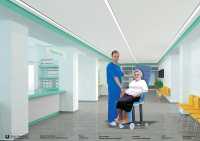Aging, Geriatrics / 29.01.2021
Keeping Healthy as an Older Adult
As you age and get older, you need to make sure your health is at the forefront of everything you do. You need to focus on keeping healthy, ensuring you have a balanced diet that includes your recommended daily allowance of nutrition, fat, and carbohydrates. Having a balanced and healthy diet can keep you in good health and keep illnesses at bay. Exercising too is good for you, even if it just a brisk daily walk. Here's more info on how to maintain health as a senior.
 Stay Active
Keeping and staying active physically is important. Nobody is saying you have to run marathons (unless, of course, you want to) but undertaking even 15 minutes of exercise a day will leave you feeling good and re-energized. If mobility is an issue, there are plenty of beneficial and fun sit-down exercises you can try from the comfort of your chair.
Be Mentally Active
You don't just need to keep your body in shape; you also have to focus on your mental strength and ability. Doing puzzles, crosswords, or having a game of chess can keep your brain stimulated and exercised. There are lots of single-player games, as well as multi-player games online and offline that can train your brain and keep it working as well as it can.
(more…)
Stay Active
Keeping and staying active physically is important. Nobody is saying you have to run marathons (unless, of course, you want to) but undertaking even 15 minutes of exercise a day will leave you feeling good and re-energized. If mobility is an issue, there are plenty of beneficial and fun sit-down exercises you can try from the comfort of your chair.
Be Mentally Active
You don't just need to keep your body in shape; you also have to focus on your mental strength and ability. Doing puzzles, crosswords, or having a game of chess can keep your brain stimulated and exercised. There are lots of single-player games, as well as multi-player games online and offline that can train your brain and keep it working as well as it can.
(more…)
 Stay Active
Keeping and staying active physically is important. Nobody is saying you have to run marathons (unless, of course, you want to) but undertaking even 15 minutes of exercise a day will leave you feeling good and re-energized. If mobility is an issue, there are plenty of beneficial and fun sit-down exercises you can try from the comfort of your chair.
Be Mentally Active
You don't just need to keep your body in shape; you also have to focus on your mental strength and ability. Doing puzzles, crosswords, or having a game of chess can keep your brain stimulated and exercised. There are lots of single-player games, as well as multi-player games online and offline that can train your brain and keep it working as well as it can.
(more…)
Stay Active
Keeping and staying active physically is important. Nobody is saying you have to run marathons (unless, of course, you want to) but undertaking even 15 minutes of exercise a day will leave you feeling good and re-energized. If mobility is an issue, there are plenty of beneficial and fun sit-down exercises you can try from the comfort of your chair.
Be Mentally Active
You don't just need to keep your body in shape; you also have to focus on your mental strength and ability. Doing puzzles, crosswords, or having a game of chess can keep your brain stimulated and exercised. There are lots of single-player games, as well as multi-player games online and offline that can train your brain and keep it working as well as it can.
(more…)




























 Cara Tannenbaum, MD, MSc
Director | Directrice
Canadian Deprescribing Network
MedicalResearch.com: What is the background for this study? What are the main findings?
Response: The D-Prescribe trial was driven by the need to show that seniors can cut down on their medication in a safe and effective manner. Pharmacists intervened in a proactive way to flag patients who were on potentially risky meds such as sleeping pills, NSAIDs and glyburide and to inform them of the risks, using an educational brochure. Pharmacists also communicated with their physician using an evidence-based pharmaceutical opinion to spark conversations about deprescribing. As a result, 43% of patients succeeded in discontinuing at least one medication over the next 6 months.
Cara Tannenbaum, MD, MSc
Director | Directrice
Canadian Deprescribing Network
MedicalResearch.com: What is the background for this study? What are the main findings?
Response: The D-Prescribe trial was driven by the need to show that seniors can cut down on their medication in a safe and effective manner. Pharmacists intervened in a proactive way to flag patients who were on potentially risky meds such as sleeping pills, NSAIDs and glyburide and to inform them of the risks, using an educational brochure. Pharmacists also communicated with their physician using an evidence-based pharmaceutical opinion to spark conversations about deprescribing. As a result, 43% of patients succeeded in discontinuing at least one medication over the next 6 months.
